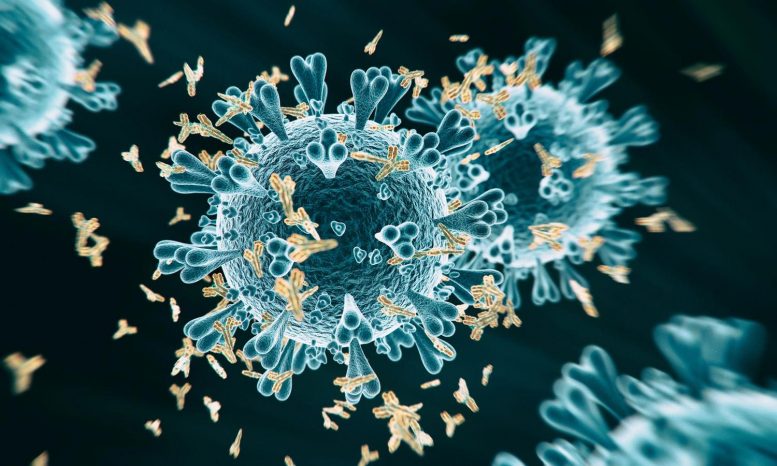
Antibodies that enhance COVID-19 in test tubes showed no harmful effects in animal models, supporting their safety in vaccines and therapies.
In the fight against viruses, antibodies have the potential to either block infection or enable infection and make the disease worse, leading to concern about their use as a therapy for COVID-19.
In a study published in the journal Cell, Duke investigators demonstrated in mice and monkeys that human antibodies lacked the ability to make SARS-CoV-2 infection worse and, instead, exerted their defensive powers against the infection. The findings help reinforce evidence that antibodies are safe when given as treatments or induced by COVID-19 vaccines.
Neutralizing vs. Enhancing Antibodies
The two types of antibodies — those that neutralize the virus or those that enhance virus replication — have been the subjects of much research, raising concerns that antibodies could potentially trigger severe infections in some recipients.
But the current research, led by scientists at the Duke Human Vaccine Institute, is the first to use animal models to examine what occurs when SARS-CoV-2 antibodies are tested with the virus.
“Our study, using mice and monkeys, demonstrates that antibodies that are potentially harmful in the test tube do not appear to be harmful in the setting of SARS-CoV-2 infection in mice or monkeys,” said co-senior author Barton F. Haynes, M.D., director of the Duke Human Vaccine Institute (DHVI).
“We tested a number of disease-enhancing antibodies in mouse and monkey experiments — multiple trials with different antibodies — and determined that disease enhancement does not occur in the animals, and that’s good news for the development of effective treatments and vaccines,” Haynes said.
Senior author Kevin Saunders, Ph.D., director of research at DHVI, isolated more than 1,700 antibodies from people who had COVID and screened them for their effects on the virus.
“We quickly found a set that were capable of blocking infection, including a set of antibodies that are candidates for clinical trials to prevent people from getting COVID,” Saunders said. “We also found a set of antibodies that, instead of preventing infection in tissue culture, they enhanced infection in the test tube.”
Protective Antibodies Outperform Enhancing Ones
But in tests administering the antibodies to mice and monkeys, there were no such effects in the body that could be attributed to antibody administration. The presence of the infection-enhancing antibodies also did not counter how well the protective antibodies functioned in the body.
“These results in animal models suggest that SARS-CoV-2 antibody treatments or the induction of SARS-CoV-2 antibodies by vaccination have a low likelihood of exacerbating COVID-19 disease in humans,” Saunders said. “Our findings are immediately applicable to COVID-19 vaccine candidates under development in use, and to antibodies and plasma being used to treat COVID-19.”
Reference: “In vitro and in vivo functions of SARS-CoV-2 infection-enhancing and neutralizing antibodies” by Dapeng Li, Robert J. Edwards, Kartik Manne, David R. Martinez, Alexandra Schäfer, S. Munir Alam, Kevin Wiehe, Xiaozhi Lu, Robert Parks, Laura L. Sutherland, Thomas H. Oguin III, Charlene McDanal, Lautaro G. Perez, Katayoun Mansouri, Sophie M.C. Gobeil, Katarzyna Janowska, Victoria Stalls, Megan Kopp, Fangping Cai, Esther Lee, Andrew Foulger, Giovanna E. Hernandez, Aja Sanzone, Kedamawit Tilahun, Chuancang Jiang, Longping V. Tse, Kevin W. Bock, Mahnaz Minai, Bianca M. Nagata, Kenneth Cronin, Victoria Gee-Lai, Margaret Deyton, Maggie Barr, Tarra Von Holle, Andrew N. Macintyre, Erica Stover, Jared Feldman, Blake M. Hauser, Timothy M. Caradonna, Trevor D. Scobey, Wes Rountree, Yunfei Wang, M. Anthony Moody, Derek W. Cain, C. Todd DeMarco, Thomas N. Denny, Christopher W. Woods, Elizabeth W. Petzold, Aaron G. Schmidt, I-Ting Teng, Tongqing Zhou, Peter D. Kwong, John R. Mascola, Barney S. Graham, Ian N. Moore, Robert Seder, Hanne Andersen, Mark G. Lewis, David C. Montefiori, Gregory D. Sempowski, Ralph S. Baric, Priyamvada Acharya, Barton F. Haynes and Kevin O. Saunders, 18 June 2021, Cell.
DOI: 10.1016/j.cell.2021.06.021
In addition to Saunders and Haynes, study authors include Dapeng Li, Robert J Edwards, Kartik Manne, David R. Martinez, Alexandra Schäfer, S. Munir Alam, Kevin Wiehe, Xiaozhi Lu, Robert Parks, Laura L. Sutherland, Thomas H. Oguin III, Charlene McDanal, Lautaro G. Perez, Katayoun Mansouri, Sophie M. C. Gobeil, Katarzyna Janowska, Victoria Stalls, Megan Kopp, Fangping Cai, Esther Lee, Andrew Foulger, Giovanna Hernandez, Aja Sanzone, Kedamawit Tilahun, Chuancang Jiang, Longping V. Tse, Ken Cronin, Victoria Gee-Lai, Margaret Deyton, Maggie Barr, Tarra Von Holle, M. Anthony Moody, Derek W. Cain, Aaron Schmidt, Tongqing Zhou, John Mascola, Barney Graham, Ian N. Moore, Robert Seder, Hanne Andersen, Mark G. Lewis, David C. Montefiori, Gregory Sempowski, Ralph S. Baric and Priyamvada Acharya.
The study received support in part from a cooperative agreement with the Department of Defense/DARPA (HR0011-17-2-0069), the National Institutes of Health (UC6-AI058607, R01-AI145687), and the State of North Carolina through the Coronavirus Aid, Relief, and Economic Security Act (CARES Act). A full disclosure of funding sources is provided in the study.
Never miss a breakthrough: Join the SciTechDaily newsletter.
Follow us on Google, Discover, and News.